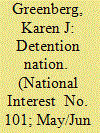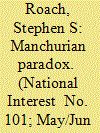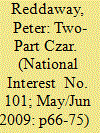|
|
|
Sort Order |
|
|
|
Items / Page
|
|
|
|
|
|
|
| Srl | Item |
| 1 |
ID:
087946


|
|
|
|
|
| Publication |
2009.
|
| Summary/Abstract |
IN FEBRUARY, four weeks into office, the Obama administration released its first prisoner in the war on terror-Binyam Mohamed. An Ethiopian citizen, Mohamed had been granted asylum status in Britain, a status which lapsed in 2004, around the time he arrived at Guantánamo Bay. Mohamed claims to have been picked up in Pakistan in April 2002, flown to Morocco where he was tortured-beaten, his penis and chest cut with a scalpel, his body burnt-and then sent on to Guantánamo, all apparently under American auspices. In this first release, there were some curious parallels with the Bush administration's version of emptying Guantánamo. Obama's team saw the transfer of Mohamed to UK custody, like the Bush White House saw the transfer and release of over 550 detainees, as a matter ultimately of diplomacy, not of legal process, one that relied upon political alliances. Moreover, the release took place outside of the military-commission proceedings. Although Mohamed was represented by Clive Stafford Smith, one of the most well-known of the detainee defense attorneys, his release, it seems, was essentially the decision of the president, not of any trial or review process. As the original commander at Guantánamo has said about the release of detainees under the Bush administration, it took a petty officer to put a detainee on a plane to Guantánamo and a presidential order to get him out.
|
|
|
|
|
|
|
|
|
|
|
|
|
|
|
|
| 2 |
ID:
087943


|
|
|
|
|
| Publication |
2009.
|
| Summary/Abstract |
THE GREAT Credit Crisis has cast into doubt much of what we thought we knew about economics. We thought that monetary policy had tamed the business cycle. We thought that because changes in central-bank policies had delivered low and stable inflation, the volatility of the pre-1985 years had been consigned to the dustbin of history; they had given way to the quaintly dubbed "Great Moderation." We thought that financial institutions and markets had come to be self-regulating-that investors could be left largely if not wholly to their own devices. Above all we thought that we had learned how to prevent the kind of financial calamity that struck the world in 1929.
|
|
|
|
|
|
|
|
|
|
|
|
|
|
|
|
| 3 |
ID:
087947


|
|
|
|
|
| Publication |
2009.
|
| Summary/Abstract |
THE CHINESE word for crisis, weiji, includes elements of both danger and opportunity. This symbolic meaning has taken on especially great significance in recent years. The emergence of modern China as a global economic power can, in fact, be dated to the nation's willingness to seize critical moments of adversity. That was very much the case during the Asian financial crisis of 1997-98, which marked a critical turning point in the ascendance of China as a major economic power. And it could also be the case today.
But there is an important catch: unlike earlier crises, it is not altogether clear that China senses the gravity of the current danger. That leaves it caught in something much closer to denial-making it difficult to seize the opportunity that peril can provide.
|
|
|
|
|
|
|
|
|
|
|
|
|
|
|
|
| 4 |
ID:
087949


|
|
|
|
|
| Publication |
2009.
|
| Summary/Abstract |
HAVING WORKED for the administrations of five former presidents, I want to offer some very unsolicited advice about the challenges the Obama administration faces in dealing with the Arab-Israeli situation. It's neither the most nor least important issue America faces abroad, nor even in the Middle East; yet experts and pundits will spill gallons of ink arguing over how important it really is to protecting American interests. But one thing about the conflict is painfully clear: unless the president tries to manage it, it will manage him.
Most American presidents have failed in dealing with what Harry Truman called the fifty-year headache. It is a two-part headache really-on one level a conflict between Israel and its Arab-state neighbors, both those who share contiguous borders with Israel and those who do not. And on another level it is a conflict between Israel and a Palestinian nationalist movement. Indeed, in the course of its involvements, the United States has had few successes in brokering agreements between these states, a handful of moments really where a combination of changes in the region and tough, smart American diplomacy came together to produce results.
Near and far misses-not to mention outright failures-have been the norm. Given the growing importance of the entire region to our national interests, continued floundering on Arab-Israeli peacemaking is something we can no longer afford. For the past sixteen years-under both Bill Clinton and George W. Bush-America has stumbled at peacemaking and bumbled at making war. As a result, we are neither feared, respected nor admired as much as we need to be in a part of the world from which the principal threat to America's security is likely to come.
|
|
|
|
|
|
|
|
|
|
|
|
|
|
|
|
| 5 |
ID:
087945


|
|
|
|
|
| Publication |
2009.
|
| Summary/Abstract |
DESPITE REGULAR reports of terminal decline, the United States continues to hold on to its preeminent international position. It has been able to do this because of two features which distinguish it from the dominant great powers of the past: American power is based on alliances rather than colonies and is associated with an ideology that is flexible, potentially universal and inherently subversive of alternative ideological forms. Together they provide a core of relationships and values to which America can return even after it has overextended itself in a particular area or decided that intervention in a particular conflict was imprudent and that withdrawal is necessary.
|
|
|
|
|
|
|
|
|
|
|
|
|
|
|
|
| 6 |
ID:
087944


|
|
|
|
|
| Publication |
2009.
|
| Summary/Abstract |
IN THE early months of the Obama presidency, the national-security debate has focused heavily on two areas: personality and process. To many, the third vital component-policy-had largely been addressed and in broad terms resolved during the presidential campaign-Iraq, Afghanistan, Iran. Yet thus far, the personality discussion has been simultaneously overblown and misdirected, the process discussion has been largely technical and misguided, and the policy discussion has failed to address the most important concerns confronting the United States. In short, after the worst eight years in modern U.S. foreign-policy history, we may be setting the stage for potentially even-bigger mistakes to come.
|
|
|
|
|
|
|
|
|
|
|
|
|
|
|
|
| 7 |
ID:
087948


|
|
|
|
|
| Publication |
2009.
|
| Summary/Abstract |
THE WORLD'S economic crisis may have profound political effects in many countries over the next year or two, but it certainly won't cause President Obama to leave office early. The same cannot be said with any certainty about President Medvedev or Prime Minister Putin of Russia. Indeed, the system of dual-executive leadership that they operate is the subject of continuous debate and increasing anxiety on the part of Russian elite groups. Some observers fear that the tandem system is becoming unstable, is undermining the cohesion of the state and-in particular-may not be able to handle the deepening recession. They are apprehensive that the two men could, before too long, lose the public trust that they now enjoy, which is a crucial linchpin holding a fragile state and society together. This in turn could cause dangerous convulsions over who should lead the country.
These observers, from academe to think tanks to business circles, see the tandem system as unnatural, first because the executive branch has only rarely in Russian history been divided. On those occasions, as in 1917 after the fall of the monarchy and in the early 1990s when Gorbachev and Yeltsin competed, the division was short-lived. Second, the history of the present arrangement, launched in December 2007, has been bizarre. Toward the end of his presidency, Vladimir Putin rejected calls to change the constitution and run for office again. Instead, he anointed a protégé, the politically weak Dmitri Medvedev, to succeed him as president. Then he had Medvedev appoint him to what was, formally, the politically inferior position of prime minister.
|
|
|
|
|
|
|
|
|
|
|
|
|
|
|
|
|
|
|
|
|